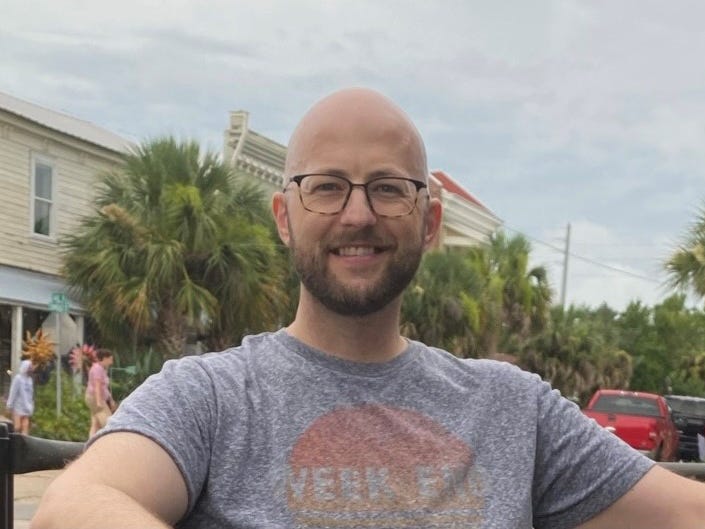
Silas Stein/picture alliance via Getty Images
- The Public Service Loan Forgiveness program has rejected 98% of applicants.
- Insider spoke to a public servant who got his student debt wiped out, but not without a fight.
- After 10 years of monthly payments, David O'Keefe was told he wasn't eligible for relief. Then six months later, he was.
- See more stories on Insider's business page.
David O'Keefe is one of the lucky ones.
In August, he managed to get the remaining balance of his student-debt load wiped out – $20,338.42 of his original $61,236 – via the Public Service Loan Forgiveness (PSLF) program. As Insider previously reported, PSLF has rejected 98% of applicants, making O'Keefe one of the fortunate 2%.
Getting his debt canceled was no easy feat, the 36-year-old Tallahassee-based public accountant for the state of Florida told Insider.
PSLF is intended to forgive student debt for public servants such as nonprofit workers, teachers, and other government employees after 120 qualifying monthly payments, but it's reportedly riddled with flaws such as processing errors and lack of communication from the companies that run it.
After O'Keefe made his 120 payments – 10 years' worth – he applied for forgiveness, and for seemingly no reason, he kept hearing he was ineligible.
He's lucky that he kept calling.
'I read that notice four times to make sure I was reading it right'
O'Keefe completed his qualifying payments in February and submitted his paperwork to FedLoan Servicing, which manages PSLF. He waited five months before he got any response.
"I spent a lot of time calling and following up," O'Keefe said. "I even contacted my congressman's office with no response, and eventually, I got a notice from my servicer, and they did it wrong. They said I was not eligible for student-loan forgiveness, and I was devastated."
When he called FedLoan, they said it was a mistake, and told him to apply again. O'Keefe told Insider that the process was "anxiety-producing" because it took follow-up after follow-up to make sure his payments were processed correctly. Luckily, he didn't have to make any extra payments because of the freeze on student-loan payments during the pandemic.

David O'Keefe
On August 19, he finally got the notice his loans were forgiven - half a year late. "I read that notice four times to make sure I was reading it right and had my wife read it, too," O'Keefe said.
"My balance is now zero."
O'Keefe's story contradicts what the Education Department has said about PSLF's high denial rates: that borrowers simply aren't meeting their qualifying payments.
President Joe Biden promised during his campaign to reform PSLF and doing so is currently on the Education Department's regulatory agenda.
Seth Frotman, executive director of the Student Borrower Protection Center, wrote on Twitter in June that PSLF is failing and needs reform. "Enough excuses. Enough deflecting. Enough of industry cashing in while borrowers struggle and @usedgov sits at the sidelines," Frotman wrote. "It's time to restore the promise of PSLF."
O'Keefe had 10 years of proof of payments, but that didn't matter when he was told he was ineligible - by mistake. He said he spent countless hours on the phone trying to get the relief that he deserved.
"It was the same thing again and again," O'Keefe said. "It was extremely frustrating."
Millions face uncertainty as servicers shut down
FedLoan Servicing, the company that denied O'Keefe for months before accepting him, will be shutting down in December, the Pennsylvania Higher Education Assistance Agency (PHEAA) announced last month.
The 8.5 million borrowers currently serviced by FedLoan will have to be transferred to a new servicer before the pandemic freeze on student-loan payments lifts in February, and Democrats and experts have been warning of the difficulties that could come with restarting payments before borrowers and servicers are ready.
The Education Department has not responded to Insider's requests for comment on how the transition will impact borrowers making payments under PSLF.
In June, Massachusetts Sen. Elizabeth Warren wrote a letter to student-loan servicers asking how they are preparing borrowers to restart payments, stressing the "disastrous" consequences that could result.
O'Keefe said he didn't receive any information on how the transition would impact his progress under PSLF, and he was relieved his debt was forgiven before the transition because of the administrative hurdles that will likely arise.
"I feel very relieved without this debt," he said. "It felt like there were two employees processing these claims for the entire nation or something."
